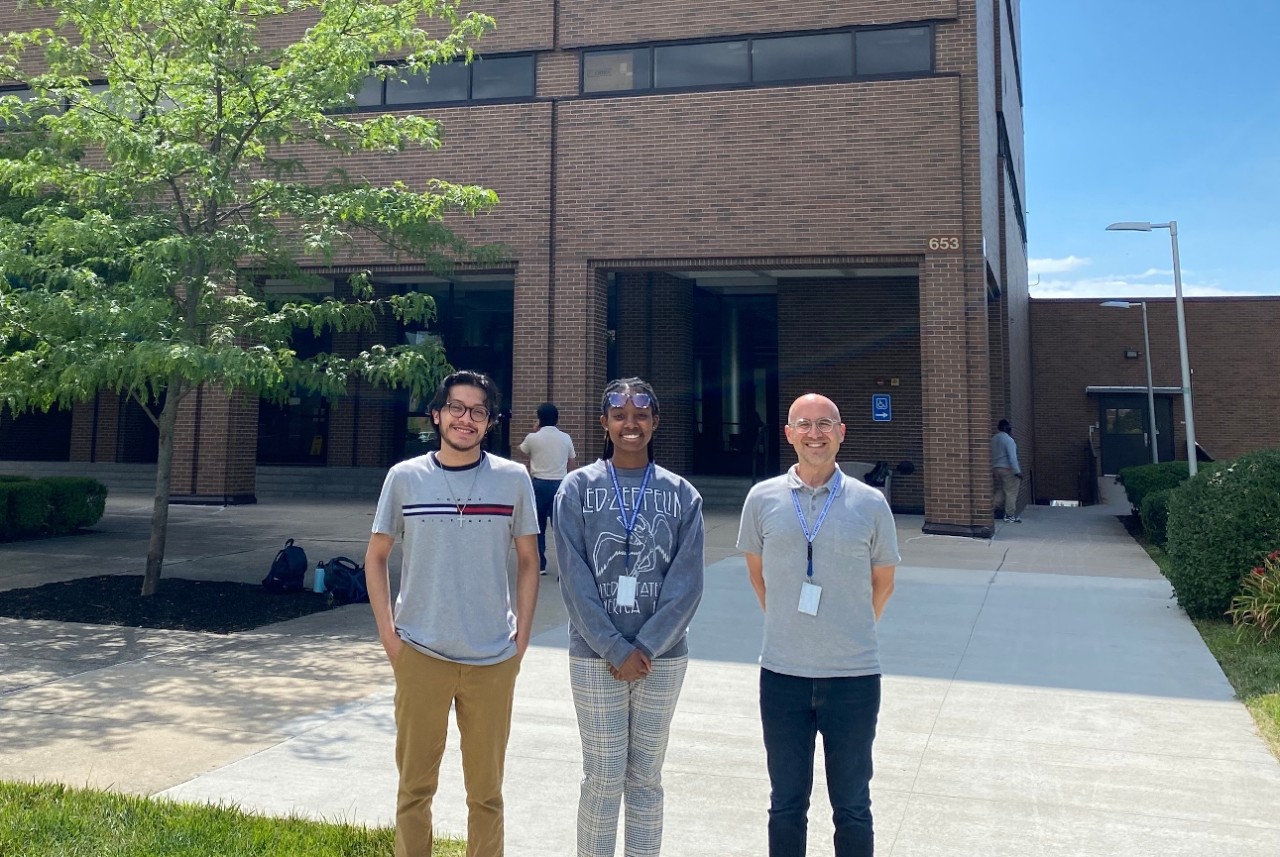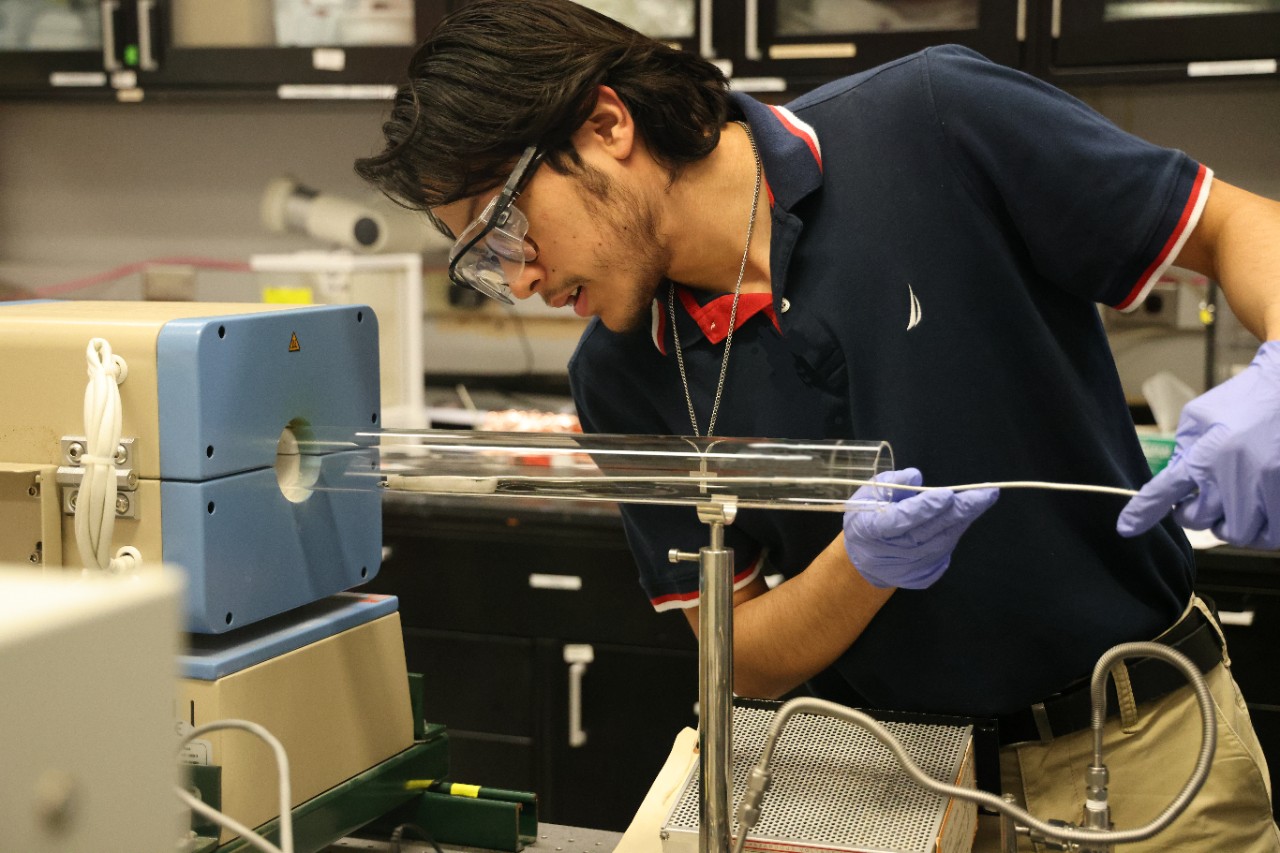
UC engineering undergraduates get summer research experience
Students are mentored through the Louis Stokes Alliance for Minority Participation program
This summer, nine University of Cincinnati undergraduate students participated in summer research through the Louis Stokes Alliance for Minority Participation Program through the National Science Foundation.
Throughout the state of Ohio, ten universities participate in the program, which is named for the former Ohio congressman and first African American from Ohio elected to the U.S. House of Representatives. It serves to increase the number of underrepresented students who earn STEM degrees and go on to graduate school.
Each student participated in the UC College of Engineering and Applied Science's Summer Bridge Program, a seven-week program before their freshman year that helps prepare them for their five years as engineering students.
Undergraduate students participating in research are matched with a faculty member they work very closely with throughout the summer between their first and second year. Eric Payton, associate professor in UC's Department of Mechanical and Materials Engineering, was a faculty mentor to two students this summer.
"I was drawn to the program because of its long, strong history of making a big impact on students' lives," Payton said.

Jesus Acosta, left, Phillisity Neal and Eric Payton stand outside the Air Force Research Lab where they conducted engineering research. Photo/Air Force Research Lab
Payton and his two mentees, Phillisity Neal and Jesus Acosta, spent the summer working at the Air Force Research Laboratory outside Dayton, Ohio, where they worked on using chemical vapor deposition as a processing technique to make thin crystals of metal carbides. Through their experimentation, they are looking to create carbide with new chemical compositions which could exhibit unique electronic properties. These materials could potentially be used as water-splitting catalysts, providing an easier method of making hydrogen for use in green energy processes, therefore reducing our reliance on fossil fuels.
I hope my mentees recognize that the faculty are here to help them. They'll always have this connection back to me and I'll do what I can to get their resume on the right desk.
Eric Payton, UC College of Engineering and Applied Science
Payton, Neal and Acosta each worked on different aspects of the research process. The characterization process for these materials uses advanced techniques including Raman spectroscopy, scanning electron microscopy, and energy dispersive spectroscopy. For Neal, an environmental studies major (an engineering major during the research program), this was her first time using any of these specialized tools.
"I was mainly working on the characterization side of things," Neal said. "I was analyzing if we were accomplishing what we were trying to do."

Phillisity Neal, second-year student, gained experience using specialized characterization tools at the Air Force Research Lab. Photo/AFRL.
"I spent a lot of the beginning portion of my research getting background information on what we were doing to set us up for success in the future," Acosta said. "Once we got to AFRL, I was the main person who dealt with the deposition systems."
Acosta, a second-year mechanical engineering major with an interest in machine design, was tasked with building the system they used to create the specimens alongside Payton and ensuring it would work properly and safely for the experimentation.
"My mentoring philosophy is about working side by side with the students, " Payton said. "We worked as a team, with Phillisity preparing specimens, Jesus running the equipment, Phillisity doing the characterization and me writing the code. We had a fun time working together."

Second-year mechanical engineering student Jesus Acosta was responsible for building the system that was used to create specimens at the Air Force Research Lab. Photo/AFRL.
The undergraduate program takes a holistic approach to student development. Along with their summer research experience, Acosta and Neal were part of a summer learning community where they were able to connect with other engineering students. As part of this community, they were given networking opportunities, and had the chance to improve skills in professionalism and research paper writing.
Don Wittrock, program manager for special grant funded projects through the college's Office of Inclusive Excellence and Community Engagement, works closely with these students to monitor their progress and experience throughout the summer program.
"Part of my job is to coach these scholars throughout the program. At the beginning, they're often overwhelmed and unsure of things, and at the end, they're talking about their data sets and processes confidently – it's amazing to see," Wittrock said.
At CEAS, students complete a five-year program that alternates between classroom instruction and real-world learning through the cooperative education (co-op) program. This rotation goes through summers as well, meaning students only have the summer after their first year free. Students can choose to take this summer as a break, take extra courses if they are interested in the ACCelerated Engineering Degree program, or they can participate in undergraduate research, like Neal and Acosta did.
"I would definitely recommend to a freshman after their first year to really consider research," Acosta said. "I'm actually continuing research in the fall with Dr. Payton. I like the 'not knowing' of research. The ability to ask questions and find new things."
Part of my job is to coach these scholars through the program. At the beginning, they're often overwhelmed and unsure of things, and at the end, they're talking about their data sets and processes confidently – it's amazing to see.
Don Wittrock, Program manager for special grant funded projects
UC's undergraduate research programs provide unique opportunities for students early in their career such as interacting closely with faculty, learning the ins and outs of research or even working in a professional laboratory or publishing papers for peer review.
Payton said they are preparing a manuscript of the work they did over the summer to be peer reviewed and published within the next year. Acosta and Neal not only gained valuable experience and insight to the world of research, but also had success with their work. Payton said their original goal was to create 45 specimens throughout the course of the summer. Their final total was 81.
"I hope my mentees recognize that the faculty are here to help them. We talked a lot about what they can do in their careers, and I hope they take this experience and go on to bigger and better things. They'll always have the connection back to me and I'll do what I can to help them get their resume on the right desk," Payton said.
Each year, several students at UC are funded through the Louis Stokes Alliance for Minority Participation Program to take part in undergraduate research and gain experiences similar to those of Acosta and Neal.
Learn more
Find additional information about the Louis Stokes Alliance for Minority Participation Program and discover the other undergraduate research opportunities that the College of Engineering and Applied Science has to offer.
Featured Image at top: Eric Payton, right, and his mentees Phillisity Neal and Jesus Acosta stand outside the Air Force Research Lab. Photo/AFRL.
Related Stories
UC engineering undergraduates get summer research experience
September 12, 2023
This summer, eight University of Cincinnati undergraduate students participated in summer research through the Louis Stokes Alliance for Minority Participation (LSAMP) Program through the National Science Foundation.
Celebrating 50 years of the National Society of Black Engineers
February 21, 2024
For half a century, the National Society of Black Engineers has committed to increasing the number of culturally responsible Black engineers who excel academically, succeed professionally and positively impact the community. UC's chapter is one of more than 600 global chapters. The organization celebrates 50 years.
UC robotics competition leads students to engineering
January 5, 2024
As a high school student, Emma Korman's interest in engineering was sparked by her experience competing in the annual University of Cincinnati robotics competition. Now, she's a second-year mechanical engineering student at UC – and she helps plan the robotics competition to inspire other local kids to follow in her footsteps.
